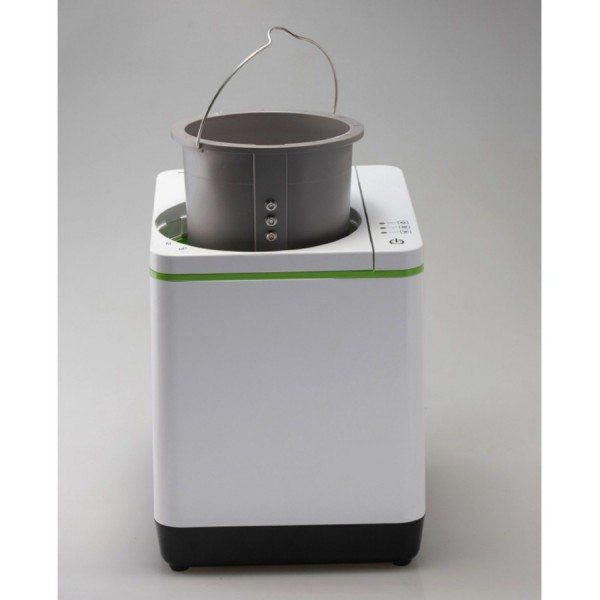I’ve been thinking about composting and buying a composter (or at least the materials for building one) for a long time now, yet the time, energy and space requirements have always been a discouragement for me. However, the Food Cycler CS-10 in-home composter from Food Cycle Science has brought composting back to the forefront of my mind and back onto my priority list. To use it, you just fill the removeable, dishwasher safe bucket with your food waste, lock the top in place, and turn it on. It works quietly, grinding the scraps and heating them up to 180 degrees F; and in as little as three hours, you will have completely dry, sterilized organic material to add to your soil. Although it does not require any additives, venting, or draining, the unit does use carbon filters (to eliminate odors) that will need to be replaced about once every three months depending on frequency of use and the type of materials being composted. The unit is 11″ wide x 14″ long x 14″ high, weighs about 20 pounds, and uses 500 watts of electricity. The Food Cycler CS-10 is available from Costco for $399 and the replacement filters are available from nofoodwaste.com for $22 for two. In addition to having an in-home composter, Food Cycle Science also has industrial versions for restaurants, hotels, amusement parks, airports, etc. to handle large quantities of food waste. The Food Cycler CS-10 Kitchen Composter is going on my wish list. 🙂
You can see just how the Food Cycler CS-10 works in the following video.




Gadgeteer Comment Policy - Please read before commenting
This doesn’t really seam all that Efficient, economical, and convenient. It’s a cool idea, but best case the filters last 3 months. thats $100 a year in filters. Plus PGE, and continually washing and cleaning the tiny container. I think I’ll stick with my rotating composer in the yard.
Love this idea. Living in a condo limits my options for composting. Definitely going to give this a try!
@John – I too thought it was a wonderful idea for those in just your situation and for those who are like me. I live in a somewhat tightly packed subdivision and do NOT want to attract animals or emit any foul odors that the neighbors might detect. In addition I really don’t have very much to compost and this seems ideal for me.
@Andrew – I knew that this composter would not appeal to many people especially because of the price and the fact that if you have the space you could build your own at a fraction of the cost.
It seems that that device is an oxymoron.
The idea of composting is to be green. Having an appliance cook your refuse to 180 degree for a few hours doesn’t seem to be that green.
@meistervu – According to Food Cycle Science’s website, 40% of landfill content is food waste. So if we were able to spare landfills of this waste – that’s green. And of course by using immediately available compost to replenish our soils of depleted nutrients instead of having to apply commercial fertilizers is also green. I know that it’s a machine made of plastic and metal but so are the machines that recycle our plastics and paper. They all also use electricity, however, it’s still a huge step in the right direction, IMO.
@Kathleen – Yes, I agree that composting is a good idea. However I question the cost/benefit of this powered compost gadget. Not the monetary cost, but rather the environmental cost.
The way I see it, if you have a garden, then it’s rather simple to have a compost bin that cost no energy to run, and no complex manufacturing to create like that gadget does. That is good.
If you don’t have the space for a garden or a compost bin, then chances are you can’t use the compost you create. So, you probably won’t buy it because after a month you would have no need for composted material. Sure, you can put compost in bags and give them away as birthday or Christmas gifts but there are only so many bags you can give away.
A more realistic solution for city dwellers are green bins run by city refuse service. You keep separate green bin to be collected along with garbage and recycling materials.
Composting should be ecological and economical, this is not.
I live in a city dwelling and rent, so the outdoor space in our yard is communal. The idea of having a critter-attracting and malodorous compost in the backyard was not taken kindly by my landlord and neighbors in the building. I currently spend $15 a month for a service to pick up a small compost bucket. It costs $30-$40 to have them come bi-weekly. We continue to fill the bucket completely after 2-3 weeks, so organic waste had to be put in the garbage until my next bucket came. This is very frustrating to me. Purchasing a machine that makes compost (which I can then put in the flower pots and plots in our yard without landlord / neighbor fuss) AND no longer pay a monthly fee for pickup? The thing will pay for itself in less than two years.
Andrea – If you decided to get one of these, please stop back here and let us know what you think of it. I’m really interested to know your thoughts on how it works!